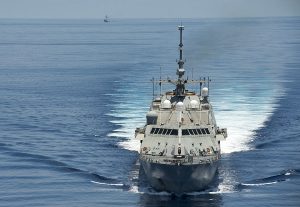Philippine President Rodrigo Duterte on Wednesday refused to acquiesce to Chinese demands to withdraw navy and coast guard vessels patrolling Philippine waters in the disputed South China Sea.
He refrained, however, from sharply criticizing the Chinese government, reiterating his desire for the Philippines to maintain friendly ties with its “good friend.”
Duterte’s comments came after an eventful few days in the South China Sea, which China claims in almost its entirety. An independent arbitral tribunal in The Hague ruled in 2016 that Beijing’s claims have no legal basis in a case brought by the Philippines, but Beijing has insisted it is not bound by the ruling.
The Philippine coast guard on Saturday started marine exercises within the country’s 200-nautical-mile Exclusive Economic Zone (EEZ), an internationally recognized area in which it has exclusive rights to oil, gas, and other resources. On Monday, China’s foreign ministry released a statement demanding that Manila “stop actions complicating the situation and escalating disputes.”
The statement sparked a furor in the Philippines. The country’s defense ministry issued its own statement saying that “China has no business telling the Philippines what it can and cannot do.”
On Tuesday, Philippine opposition senators signed a resolution accusing Beijing of “creeping hegemony” in the South China Sea, citing the illegal presence of Chinese ships in the Philippine EEZ.
Chinese ships have been departing the contested Whitsun Reef in the Spratly Islands, although nine ships remained as of mid-April, according to a government task force.
Philippine Defense Secretary Delfin Lorenzana on Wednesday said Beijing has “no authority or legal basis to prevent us from conducting these exercises.” Foreign Secretary Teodoro Locsin also ordered the filing of a diplomatic protest over the Chinese foreign ministry statement.
Duterte, however, struck a calmer tone toward a country which has always been central to his government’s ambitious infrastructure and investment plans.
The president said his country owed China a “debt of gratitude” for its decision to provide free coronavirus vaccines to the Philippines. But he insisted Manila would not compromise on its own sovereignty.
“I’ll tell China, we do not want trouble, we do not want war. But if you tell us to leave – no,” Duterte said.
The Philippine response followed a familiar pattern, as Duterte’s hawkish cabinet officials made strong public statements condemning Chinese actions in Philippine waters, while Duterte, wary of angering Chinese leaders and threatening economic cooperation, leveled his country’s stance with praise for Beijing.
But Filipinos have not taken kindly to Duterte’s response, with some taking to social media to call him a “traitor.” Filipinos staunchly support the country’s claims in the South China Sea, and Duterte’s perceived kowtowing toward China has always been the one issue on which the vast majority of Philippine nationals diverge with their popular president.
The Philippines has taken a particularly hard line in recent weeks on the South China Sea, which has also emerged as a key foreign policy priority for the United States under President Joe Biden.
The Visiting Forces Agreement, which allows U.S. troops to train with their Philippine counterparts and is considered a bedrock of the security alliance between Washington and Manila, was terminated by Duterte last year but has yet to lapse and will likely be renewed.
While Manila has welcomed U.S. help in defending its maritime claims, this will likely come at a cost: Philippine officials are eager for the U.S. to provide military aid and approve arms sales should the agreement be renewed.

































